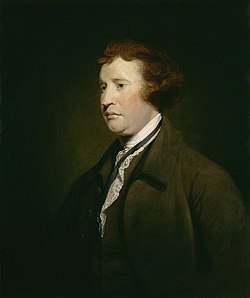
Back Edmund Burke Afrikaans إدموند بيرك Arabic ادموند بيرك (فيلسوف من مملكه ايرلاندا) ARZ Edmund Burke AST Edmund Börk Azerbaijani ادموند برک AZB Эдмунд Бёрк Byelorussian Эдмунд Бэрк BE-X-OLD Едмънд Бърк Bulgarian এডমান্ড বার্ক Bengali/Bangla
Edmund Burke | |
|---|---|
 Rt. Hon. Edmund Burke | |
| Sinh | 12 tháng 1 năm 1729 Dublin, Ireland |
| Mất | 9 tháng 7 năm 1797 (68 tuổi) Beaconsfield, Buckinghamshire, Vương quốc Anh |
| Thời kỳ | Triết học thế kỷ 18 |
| Vùng | Triết học phương Tây |
| Trường phái | |
Đối tượng chính | Triết học chính trị và xã hội |
Ảnh hưởng bởi | |
Edmund Burke (12 tháng 1 năm 1729[1] - 9 tháng 7 năm 1797) là một chính khách, nhà văn, nhà hùng, nhà lý thuyết học chính trị, và nhà triết học người Ireland.[2][3] Sau khi chuyển tới Anh sinh sống, Edmund Burke đã phục vụ nhiều năm trong Viện Thứ dân Vương quốc Anh với tư cách là thành viên của đảng Whig.
Ông được nhớ đến chủ yếu là người đã ủng hộ những nhà Cách mạng Hoa Kỳ, và sau đó là phản đối cuộc Cách mạng Pháp. Sự phản đối cuộc cách mạng Pháp của Burke đã khiến ông trở thành nhân vật đi đầu thuộc phái bảo thủ trong đảng Whig, bè phái mà ông gọi là "Old Whigs" (Đảng viên Whig già), đối lập với những người ủng hộ cuộc cách mạng Pháp "New Whigs" (Đảng viên Whig trẻ), đứng đầu bởi Charles James Fox.
Edmund Burke được xem là nhà sáng lập tư tưởng của chủ nghĩa bảo thủ hiện đại,[4][5] và là đại diện của chủ nghĩa tự do cổ điển.[6]
- ^ The exact year of his birth is the subject of a great deal of controversy; 1728, 1729 and 1730 have been proposed. His date of birth is also subject to question, a problem compounded by the Julian-Gregorian changeover in 1752, during his lifetime. For a fuller treatment of the question, see F. P. Lock, Edmund Burke. Volume I: 1730–1784 (Clarendon Press, 1999), pp. 16–17. Conor Cruise O'Brien (2008; p. 14) questions Burke's birthplace as having been in Dublin, arguing in favour of Shanballymore, Co. Cork (in the house of his uncle, James Nagle).
- ^ Clark, J.C.D (2001). Edmund Burke: Reflections on the Revolution in France: a Critical Edition. Stanford. tr. 25. ISBN 0-8047-3923-4.
Edmund Burke was an Irishman, born in Dublin but in an age before 'Celtic nationalism' had been constructed to make Irishness and Englishness incompatible: he was therefore free also to describe himself, without misrepresentation, as 'a loyalist being loyal to England' to denote his membership of the wider polity. He never attempted to disguise his Irishness (as some ambitious Scots in eighteenth-century England tried to anglicise their accents), did what he could in the Commons to promote the interests of his native country and was bitterly opposed to the Penal Laws against Irish Catholics.
- ^ Hitchens, Christopher (tháng 4 năm 2004). “Reactionary Prophet”. The Atlantic. Washington.
Edmund Burke was neither an Englishman nor a Tory. He was an Irishman, probably a Catholic Irishman at that (even if perhaps a secret sympathizer), and for the greater part of his life he upheld the more liberal principles of the Whig faction.
- ^ Andrew Heywood, Political Ideologies: An Introduction. Third Edition (Palgrave Macmillan, 2003), p. 74.
- ^ F. P. Lock, Edmund Burke. Volume II: 1784–1797 (Clarendon Press, 2006), p. 585.
- ^ Razeen Sally, Classical Liberalism and International Economic Order, (Routledge, 1998). p. 80.